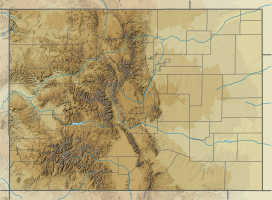Wagon Wheel Gap is a gap and ghost town alongside the Rio Grande River, 7.5 miles (12.1 km) southeast of Creede Mineral County, Colorado.[1] Wagon Wheel Gap, on the Silver Thread Scenic and Historic Byway (Colorado State Highway 149),[2] is at 8,468 feet (2,581 m) in altitude.[1]
| Wagon Wheel Gap | |
|---|---|
 Rio Grande at Wagon Wheel Gap, between 1879 and 1894 | |
| Elevation | 8,468 feet (2,581 m) |
| Location | Mineral County, Colorado |
| Coordinates | 37°46′25″N 106°49′52″W / 37.7736°N 106.8312°W |
History
editThe hot springs at Wagon Wheel Gap were called "Little Medicine", as compared to the "Big Medicine" at Pagosa Springs, by the Ute people because of their healing properties.[2]
Settlers arrived at Wagon Wheel Gap by 1848 and farmed the land.[3] Miners entered the area to prospect for precious metals, which Utes like Colorow thought that their digging and taking the rocks made the gods angry. In 1860, a miner named Charles Baker had a confrontation with Colorow and he ran away from the Ute.[2] While crossing the Rio Grande at the gap, Baker lost a wagon wheel and wrecked his wagon. The wheel remained stuck in the mud. After that, the spot was known as Wagon Wheel Gap.[1][2]
Wagon Wheel Gap was the first tollgate for travel between South Fork and Lake City. In the 1870s it was a stage stop and a supply town.[2]
There were not many settlers in the area until railroad magnate William Jackson Palmer transported and provided lodging for visitors to the hot springs beginning in 1883.[3] At the turn of the century, Palmer built a bath house. In the 1950s, the bath house was renamed 4UR Ranch.[3] The resort, now listed on the National Register of Historic Places, was purchased by the Leavell family in 1972.[3]
Fluorspar mines, near the gap, operated from 1911 to 1950.[3] Colorado Fuel & Iron sold the mine to the Leavell family in 1980.[3]
Today, Wagon Wheel Gap is part of a dude ranch that offers bathing in the hot springs.
References
edit
